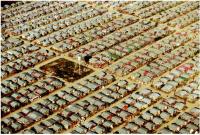Ric Oberlink, spokesman for Californians for Population Stabilization, said although global warming is very serious, it is a “subset” of the overpopulation problem: “If we had half as many people, we wouldn’t have much of a climatic warming problem.”
Many have noted America’s disproportionate impact on greenhouse emissions and rightly called for cutbacks, Oberlink told Cybercast News Service , but it’s hypocritical to say Americans consume too much, and then say it doesn’t matter how many Americans there are.
Oberlink criticized environmental groups for not addressing population growth: “It’s easier to single out targets like Big Oil and Big Detroit instead of calling for changes in personal behavior or taking on a tough issue like population growth with its concomitant connection to volatile issues like immigration or access to birth control.”
Subscribe to our newsletter
Stay up to date with DeSmog news and alerts







